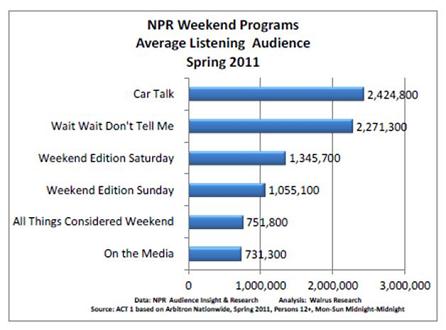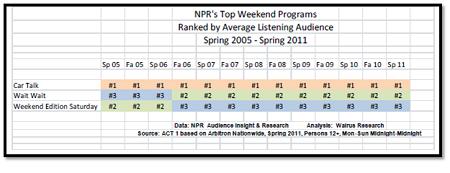We continue our series of Best of JacoBLOG with a post that resonated in radio circles – public and commercial. It’s a lesson in consistency, persistence, and quality. And our 6-pack of lessons was very well-read. See what you think. – FJ
PPM has taught us a lot about how people actually listen to the radio. And the importance and role of weekend programming is one of those important lessons. Put together great weekends and it makes a big difference in your overall rank.
On that topic, just before the end of 2011, researcher, George Bailey, a public media guru, distributed a report about the most-listened to weekend shows in public radio – that is, among NPR weekend programs.
The results may surprise you only because they fit the old “the more things change” axiom. As the results of George’s Walrus Research’s data show, the venerable Car Talk continues to be the most listened to weekend show in the NPR lineup, followed by the hot rising star, Wait, Wait, Don’t Tell Me.
These shows have two important things in common – they’re both highly edited programs, and they’re both produced by Doug Berman (or “Bongo Boy” as he’s called by Click n’ Clack on Car Talk), one of the best in the business. It’s no surprise that George’s research shows strength for the iconic Car Talk as well as the Peabody Award winning WWDTM.
 The other factoid that jumped out at me from Bailey’s weekend research is the consistency of these shows over time.
The other factoid that jumped out at me from Bailey’s weekend research is the consistency of these shows over time.
 It doesn’t matter whether it’s diary or PPM, great content has a way of usually rising to the top. Here is a 6-pack of takeaways from this Walrus Research study that can hopefully help any station with weekend planning and strategy:
It doesn’t matter whether it’s diary or PPM, great content has a way of usually rising to the top. Here is a 6-pack of takeaways from this Walrus Research study that can hopefully help any station with weekend planning and strategy:
- Great programmers can program anything. Car Talk and WWDTM have nothing in common except the guy who produces both shows. When you find a great programmer, producer, or talent who can create hits, sign him or her to a long-term contract.
- Know your audience. Consumers like all sorts of programs – music, news, quiz shows, and even a couple of New Englanders talking about cars. As George reminds us, it’s “not simply lining up programs that appear to be the same kind. Instead, what matters is projecting the same core values to the same target audience.” What is your audience “into” besides the music you play?
- Weekends matter. If you’re mailing them in, ignoring them, or running them on “auto pilot,” think again. Strong weekends make a big difference in the total number and, of course, they’re your lead-in to Mondays. There are six NPR weekend programs that serve more than a half million average listening persons. That has to be a core reason why public radio ratings continue to grow.
- Great programming transcends ratings methodology. As George’s charts show, whether back in ’05 when we lived in the diary world, or in recent years when PPM has dominated the landscape, these shows performed at about the same level. Yes, there are exceptions, but programming and personalities that are winners look great even if you’re measuring listeners with stick figures.
- Do what George did. How many programmers don’t know how their specialty programs perform, especially on weekends? Using the metrics and analytics are a part of making sound programming decisions. Public radio programmers now have some statistical ammo from which to make smart, strategic calls.
- Do your programming homework. Last year, public radio learned a lot about the majority of its programming lineup in the form of a study that we designed and conducted for PRPD – the Public Radio Program Directors Association. (Yes, they have an entire organization devoted to just programming, as well a great annual conference.) Our survey was an in-depth look at public radio programs, designed to be used as a guide for stations everywhere. We interviewed listeners as well as programmers to compare perspectives. These kinds of tools are essential to gaining a better understanding and context of the moving target that we fondly call “the audience.”
Have a great weekend.
Note: This post was corrected on 3/21 after Kimberly Haas pointed out that the Walrus Research analysis consisted of all NPR weekend shows, rather than public radio weekend shows as the original post suggested.
- Media And Technology In 2025: Believe It Or Not! - April 18, 2025
- In Radio, You Just Never Know - April 17, 2025
- The Secret To Making A Great Podcast (And Great Radio) - April 16, 2025




Put me on your mailing list, pleeze